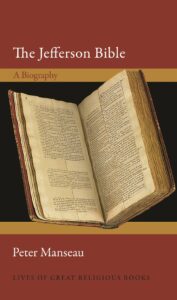 A Biography
A Biography
In this book, author Peter Manseau tells the story of the Jefferson Bible, an edition of the New Testament that was edited with a penknife and glue to remove all mention of miracles and other supernatural events. Manseau tells the story of this book not just as an investigation in the fascinating world of Jefferson’s mind, but also to explore how each new generation has reimagined the bible in its own image, and for their own purposes.
Thomas Jefferson created his bible because he was inspired by the ideals of the Enlightenment, and hoped to reconcile Christian tradition with reason by presenting Jesus as a great moral teacher instead of a divine one. It was completed in 1820 and then lost for decades before being rediscovered, and since it’s republication it has meant many different things to many different people. Some have held it up as evidence that America was founded as a Christian nation, while others see it as proof of the Founders’ belief in separation of church and state; Manseau, however, works to contextualize it as part of Jefferson’s personal philosophy.
The Jefferson Bible is inseparable from American religious disputes over the interpretation of scripture, and the search for the historical Jesus. The Jefferson Bible helps readers grapple with both the legacy of the man who made it and the place of religion in American life.
Reviews and endorsements of the publication include:
“Excellent. . . . As Manseau observes, the ways in which Americans have received the Jefferson Bible may be more interesting than the ways by which Jefferson conceived it.”—John Miller, Angelus
“A brilliant account. The reader is in for an enlightening foray that explains Jefferson’s book for what it tells us about Jefferson himself, the cultural history of interpreting scripture, and the religious and political import of how Americans have viewed Jesus.”—Sylvester A. Johnson, author of African American Religions, 1500–2000: Colonialism, Democracy, and Freedom
“A page-turner for thoughtful readers. Manseau offers a compelling window onto Jefferson’s intellectual processes and a unique perspective on the larger history of religion in America, especially as it relates to American cultural divides concerning efforts to sort out the Jesus of history from the Christ of faith.”—Timothy Beal, author of The Rise and Fall of the Bible: The Unexpected History of an Accidental Book
For more information on the publication, click here.
Fellow travelers are scholars, activists, and practitioners that embody the ideals and commitments of the Project on Lived Theology. We admire their work and are grateful to be walking alongside them in the development and dissemination of Lived Theology.
